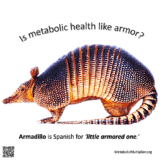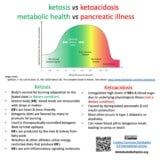Can Low-Carb agree to disagree on these 12 topics?

There are many camps within the low-carb community with differing views. These differences are most likely to occur in areas where the science is not yet settled. Consensus to collaborate is important in a community.
If we agree to disagree, that is a consensus.
As part of Adele Hite, RD, PhD, MPH’s work developing the Clinical Guidelines for Therapeutic Carbohydrate Restriction, she and Dr. Sarah Halberg, MD put together this list of 12 “agree to disagree” topics.
In honor of Sarah Halberg’s legacy, we are publishing their “agree to disagree list”. We encourage you to join us in donating to Sarah’s legacy charity, Reversing Type 2 Diabetes. Let’s honor both of their memories by bringing our community together. Both Sarah and Adele passed in 2022.
1. Strict carbohydrate limits
Should all carbohydrate-reduced interventions be a strict low-carb ketogenic approach?
2. Non-caloric sweeteners
- Is there a place for non-caloric sweeteners in low-carb nutrition?
- In which cases are they useful as transition devices?
- Do patients have bio-individual responses to different ones?
3. Net vs. total carbs
- When and how does differentiating between “net” and “total” carbohydrate content of food matter?
- Does the formula agreed upon in the epilepsy guidelines apply? For which other indications? For Therapeutic Carbohydrate Restriction in general?.
4. Addiction
- Is there such a thing as “sugar addiction” or “carb addiction”? If so, how is it defined, quantified, and treated?
- A related issue: Is there such a thing as “processed food addiction”? If so, how is it defined, quantified, and treated?
5. Calories
- Is there a “metabolic advantage” to low-carb/ketogenic diets? If so, what is it and when does it occur?
- Do calories “count”?
- Is calorie restriction ever necessary in low-carb nutrition?
6. Ketosis
- Is there an “optimal” level of ketosis for different health goals? Is it a biomarker?
- When is testing for nutritional ketosis beneficial? Does it vary by individual in addition to by condition?
7. Protein
In low-carb nutrition, should there be limits on protein intake (“causes glucose spike”) or should protein intake be unlimited (for reasons of satiety and because it is the essential macronutrient for lean mass)?
8. Soy
Is there a place for soy in low-carb nutrition?
9. Grass-fed meats
- In low-carb nutrition, is it important that animal products be from pasture-raised and/or grass-fed animals?
- Is this due to impacts on human nutrition, the environment or both?
10. LDL-cholesterol
Does an elevated LDL-cholesterol level have the same health implications for someone on a low-carb diet as for someone on a higher-carb diet?
11. Vegetable oils
- Is there a place for vegetable oils in low-carb nutrition?
- What if someone is on a budget and that is what they can afford?
- If someone does not cook or travels and eats commercially prepared food which is likely to contain these oils? How about the use of specialty oils (sesame, mustard) in traditional cuisines for flavor?
12. Supplements?
Are supplements important in low-carb nutrition? If so, which ones?
How might our agree to disagree list be used?
We are looking forward to practitioners, scientists, and other thought leaders addressing these ambiguities. An example is Bret Scher, MD’s podcast, Vegetable oils: are they healthy? Do you know of examples where thought leaders have helped build consensus by agreeing to disagree? Let us know in the comments and we’ll include them in our round-up guides.
Other areas our community might agree to disagree?
We at Metabolic Multiplier are diet diplomats. We support medical nutrition therapies that help people meet their health goals. These therapies may be reduced carbohydrates (Therapeutic Carbohydrate Reduction (TCR) or Ketogenic Diet Therapies (KDT)), Mediterranean, Paleolithic, vegetarian, whole foods, carnivore, or simply reducing sugar & ultra-processed foods.
Are there any other topics that you would like to see the Low-Carb agree to disagree on? Please tell us in the comments. Let’s honor the greats whose shoulders we stand on by expanding science with nuanced discussion. That was Adele Hite’s wish until the end.










